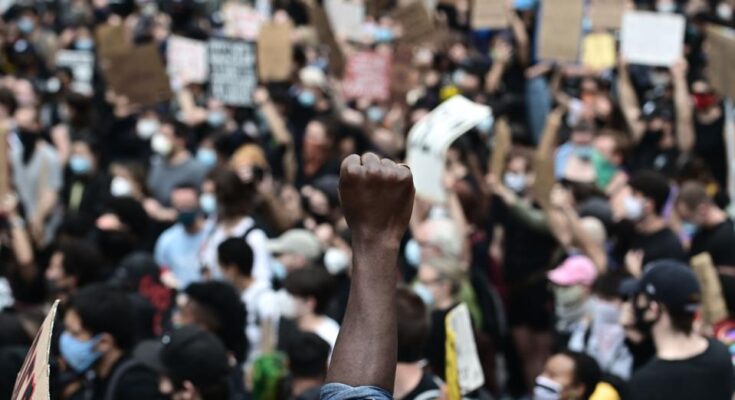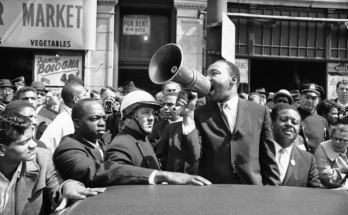Written by Yusuf George for Forbes.com
It’s good that corporate America has started to add its voice to the George Floyd protests. Business can and must play a leading role in addressing racial equity.
This past weekend, my mother and grandmother sat in the living room of my grandparents’ Brooklyn apartment, listening to the echoes of the past, as protesters and police clashed outside.
For me and many other Black Americans, we have been carrying the trauma and inequity that has ignited this social unrest long before it was televised. This is not new. And while it may be shocking to some, we are still struggling with the legacy of centuries of exploitation and subjugation of Black lives – from slavery, to Jim Crow, to mass incarceration – the root causes of where we are today.
The recent deaths of Black Americans – George Floyd, Breonna Taylor, and Ahmaud Arbery – coupled with the COVID-19 pandemic, have exposed serious and profound fault lines in the country. Factors like a lack of access to affordable healthcare, higher levels of unemployment, lower wages, the racial wealth gap, unequal access to quality education, have created barriers to the well-being of Black Americans.
Well before coronavirus and this period of social unrest, Black Americans have historically faced considerable barriers in the labor market, including discrimination in their job searches, occupational segregation, lower wages, increased risks of being fired, and higher levels of unemployment than their White counterparts.
At JUST Capital, we are motivated by the increasing number of corporations that are working to create a more just economy through stakeholder capitalism. If they take this approach seriously, they must do what they can to redress these racial inequities, which unfortunately grow deeper and more complex with each passing day.
Of the more than 100,000 Americans who have died from COVID-19, there is a disproportionately high number of deaths among members in the Black community. One of the reasons for this is that Black workers hold a higher proportion of jobs as essential workers on the frontline in grocery stores, public transit, and healthcare, as well as in cleaning staffs across businesses. It’s an unfortunate situation that many Black workers have had to choose between protecting their health and earning an (albeit low) income. Bureau of Labor Statistics data from April shows that African American unemployment has jumped to 16.7%, and a recent McKinsey report noted that 39% of all jobs held by Black Americans are now threatened by reductions in hours or pay, temporary furloughs, or permanent layoffs, totaling 7 million jobs.
In recent years, and especially over the last few days, business leaders have been adding their voices to the chorus of mourning, acknowledging and recognizing the racial divides that plague our society and economy. That’s obviously an important step, and it is welcomed. But we need more. As we stare down both economic recession and systemic discrimination, business leaders in America today have both a moral and economic responsibility to provide Black communities the financial and mental support that they so desperately deserve, as well as the opportunity for advancement and access to the resources required to do so. And if we wish to rebuild better on the other side of these crises, leaders must commit to actively working toward permanently eradicating the social and economic oppression of Black Americans, and addressing the structural inequities revealed by these appalling statistics.
First, don’t be silent. It starts with work in-house. In the past few days, CEOs from companies such as Target TGT +0.5%, Intel INTC +1.9%, Lowes, JPMorgan Chase JPM +1.4%, and Verizon VZ -0.7% have issued statements committing to support Black employees and communities, and to work on issues of racial equity. More are adding their voices. Thank you, but more needs to be done.
Second, listen to your Black employees and provide them with much-needed assistance in this moment. Provide employees with hazard pay and paid sick leave if they are performing essential services, back-up dependent care for those facing childcare issues, and mental health services – as this time is incredibly emotionally taxing. Many of your Black employees will have lost family members, friends, or members of their community. Provide your employees with some paid time off to mourn these losses. If you’ve had to consider furloughs or layoffs, do the work in advance to understand whether your plans disproportionately affect your Black employees.
Third, review representation of Black employees in your workforce to ensure that your team reflects the demographic makeup of the U.S., that Black workers are represented across all levels of your business, and that workers are receiving equal pay. And after that review has taken place, share the results. Our research shows that less than half (40%) of companies are transparent about the gender and racial makeup of their workforce. In fact, just one company – Intel – has published demographic data as part of its EEO-1 Survey and disclosed wage data by gender, ethnic, and racial breakdowns.

Disclosure of Workforce Demographic Data | JUST CAPITAL
This transparency, and the careful analysis that led to it, is a critical first step toward driving change. The results may not be pretty, but without them, corporate leaders can’t begin to have an honest internal conversation about racial equity.
As a community, we are mourning. As a nation, we are, as well. We need to start identifying what future we want for ourselves and work together to rebuild this country in an equitable way. It’s important that companies continue to work with and support Black communities in an effort to fix these structural issues and create an economy, and a country, that truly works for all Americans.
If you are looking for ways to support your Black and Brown employees, please see resources I’ve listed in this recent LinkedIn post.
Yusuf George | Yusuf is the Managing Director of Corporate Engagement at JUST Capital.







